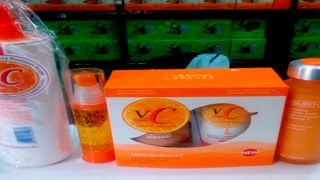
Skin lightening creams on a display in a retailer shop along River Road, Nairobi on October 10, 2019.
| File | Nation Media GroupNews
Premium
Paying high price for beauty: Harmful skin products in the market
Some of the skin-lightening and anti-ageing products on sale online contain harmful chemicals that could affect your health, a new report has warned.
The report by Zero Mercury Working Group (ZMWG) shows that four e-commerce platforms in Kenya still sell products that contain mercury despite calls for them to be taken off the shelves.
The four online platforms were reported in the study to have creams that were in 2019 touted as unsafe because they contained high levels of mercury.
Kenya mainly sells six cream products that contain high mercury levels. These are Chandni Whitening cream, Golden Pearl, Noor Herbal Beauty Cream, Dr Japan, Aneeza Gold Beauty cream and Faiza Beauty Cream.
Other products sold globally and are easily accessible online are Due Beauty cream, Goree creams and Kim Whitening creams.
A spot check by the Nation on some of those products on the Kenyan online shops shows that their price ranges from Sh200 to about Sh1,500. The Nation also learnt that some online shops were not mentioned in the report but also sell products like Faiza beauty cream, which go for Sh600.
But why is mercury dangerous?
The World Health Organisation in its update on Mercury and Health says that the inhalation of mercury vapour can produce harmful effects on the nervous, digestive and immune systems, lungs and kidneys, which may be lethal.
“The inorganic salts of mercury are corrosive to the skin, eyes and gastrointestinal tract, and may induce kidney toxicity if ingested. Neurological and behavioural disorders may be observed after inhalation, ingestion or dermal exposure of different mercury compounds,” explains the WHO.
Manufacturers use mercury because its content inhibits the formation of melanin, which results in a lighter skin tone.
The report by ZMWG says that most of the high mercury products in the market are manufactured or distributed from Pakistan, Thailand and China.
The investigation which was done globally showed that in 2019 about seven online platforms globally had the creams in stock but the latest analysis which was done between 2020 and 2022 shows that about 14 more platforms had the beauty creams in stock.
This is in support of a 2017 regulation spearheaded by the Minamata Convention, which supports the ban on mercury-added products that have mercury content of more than 1 part per million (ppm).
“Of the 271 skin-lightening products tested, 129 were found to have mercury levels over 1 ppm,” said the report.
United Nation’s Environment Programme (UNEP) Executive Director Inger Andersen, during the fourth Conference of Parties on the Minamata Convention held this week, said countries face this crisis with all the tools at their disposal and tackle mercury, throughout its lifecycle, through innovative actions.
“The many countries working on mercury pollution have drawn serious attention to mercury use in artisanal and small-scale gold mining. Together with partners, including UNEP’s Global Mercury Partnership, the Convention’s work demonstrates how poverty, livelihoods, health, biodiversity and the sustainable development goals intersect,” she said
The report also says there is a possibility of fake products being sold with the brand names of some of the products but that could be an excuse used by manufacturers.
“Counterfeiting of skin-lightening products exists, and it can be hard to identify which products are counterfeit. However, a claim of counterfeiting may be used by some producers to avoid responsibility for the ingredients of their products. This is one reason online platforms must do a better job of seller and product verification. And it further reinforces the need for testing capacity in countries where SLPs are produced and/or imported,” said the report.
The report says that the current legal regulatory framework in most countries is a letdown to customers yet they should protect them from dangerous, counterfeit and illegal products sold online.
“A primary reason for this failure is that national laws in many countries allow online platforms to evade responsibility for the products sold on their platforms,” said the report
“Mercury can be eliminated from skin lightening products by working with health and environmental ministries and raising public awareness about the dangers to health from mercury and other hazardous chemicals in skin-lightening products,” recommends a report by the WHO.
Mercury can also be found in cosmetics for the eye such as mascara or eye makeup cleansing products since it is used as a preservative.





